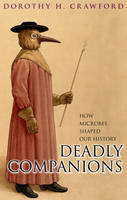
Deadly Companions
How Microbes Shaped Our History
Seiten
2007
Oxford University Press (Verlag)
978-0-19-280719-9 (ISBN)
Oxford University Press (Verlag)
978-0-19-280719-9 (ISBN)
- Titel ist leider vergriffen;
keine Neuauflage - Artikel merken
The story of human history has been inextricably entwined with the story of microbes. Combining tales of devastating epidemics with accessible science and fascinating history, Deadly Companions reveals how closely microbes have evolved with us over the millennia, shaping human culture through infection, disease, and deadly pandemic.
Ever since we started huddling together in communities, the story of human history has been inextricably entwined with the story of microbes. They have evolved and spread amongst us, shaping our culture through infection, disease, and pandemic. At the same time, our changing human culture has itself influenced the evolutionary path of microbes. Dorothy H. Crawford here shows that one cannot be truly understood without the other. Beginning with a dramatic account of the SARS pandemic at the start of the 21st century, she takes us back in time to follow the interlinked history of microbes and man, taking an up-to-date look at ancient plagues and epidemics, and identifying key changes in the way humans have lived - such as our move from hunter-gatherer to farmer to city-dweller - which made us vulnerable to microbe attack. Showing how we live our lives today - with increasing crowding and air travel - puts us once again at risk, Crawford asks whether we might ever conquer microbes completely, or whether we need to take a more microbe-centric view of the world.Among the possible answers, one thing becomes clear: that for generations to come, our deadly companions will continue to shape human history.
Ever since we started huddling together in communities, the story of human history has been inextricably entwined with the story of microbes. They have evolved and spread amongst us, shaping our culture through infection, disease, and pandemic. At the same time, our changing human culture has itself influenced the evolutionary path of microbes. Dorothy H. Crawford here shows that one cannot be truly understood without the other. Beginning with a dramatic account of the SARS pandemic at the start of the 21st century, she takes us back in time to follow the interlinked history of microbes and man, taking an up-to-date look at ancient plagues and epidemics, and identifying key changes in the way humans have lived - such as our move from hunter-gatherer to farmer to city-dweller - which made us vulnerable to microbe attack. Showing how we live our lives today - with increasing crowding and air travel - puts us once again at risk, Crawford asks whether we might ever conquer microbes completely, or whether we need to take a more microbe-centric view of the world.Among the possible answers, one thing becomes clear: that for generations to come, our deadly companions will continue to shape human history.
Dorothy Crawford is Professor of Medical Microbiology at the University of Edinburgh, where she is also Assistant Principal for the Public Understanding of Medicine. She was awarded an OBE in 2005 for services to medicine and higher education. Books by the same author: The Invisible Enemy: A Natural History of Viruses
Preface ; Introduction ; 1. How it all began ; 2. Microbes and our hunter gatherer ancestors ; 3. Microbes exploit the sedentary lifestyle ; 4. Microbes, crowds and poverty ; 5. Microbes go global ; 6. Microbes, famine and starvation ; 7. Science intervenes ; 8. Current problems ; Conclusions ; Glossary ; Index
| Erscheint lt. Verlag | 25.10.2007 |
|---|---|
| Zusatzinfo | 25 black and white line drawings and halftones |
| Verlagsort | Oxford |
| Sprache | englisch |
| Maße | 145 x 222 mm |
| Gewicht | 458 g |
| Themenwelt | Sachbuch/Ratgeber ► Natur / Technik |
| Geschichte ► Teilgebiete der Geschichte ► Kulturgeschichte | |
| Medizin / Pharmazie ► Medizinische Fachgebiete ► Mikrobiologie / Infektologie / Reisemedizin | |
| Studium ► Querschnittsbereiche ► Epidemiologie / Med. Biometrie | |
| Studium ► Querschnittsbereiche ► Geschichte / Ethik der Medizin | |
| Studium ► Querschnittsbereiche ► Infektiologie / Immunologie | |
| Naturwissenschaften | |
| ISBN-10 | 0-19-280719-6 / 0192807196 |
| ISBN-13 | 978-0-19-280719-9 / 9780192807199 |
| Zustand | Neuware |
| Haben Sie eine Frage zum Produkt? |
Mehr entdecken
aus dem Bereich
aus dem Bereich
der stille Abschied vom bäuerlichen Leben in Deutschland
Buch | Hardcover (2023)
C.H.Beck (Verlag)
23,00 €
vom Mittelalter bis zur Gegenwart
Buch | Softcover (2024)
C.H.Beck (Verlag)
12,00 €


